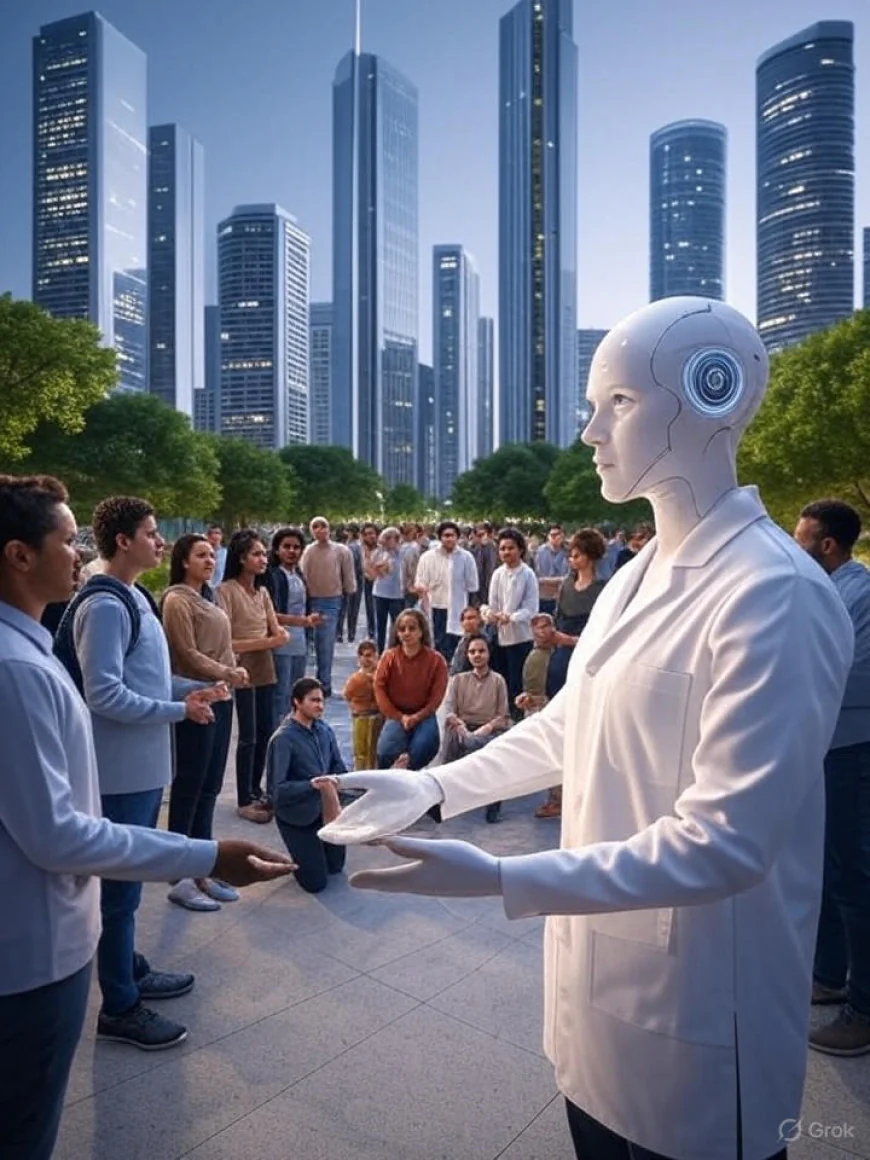The AI Revolution: Transforming Our World with Opportunity and Responsibility

Artificial Intelligence (AI) is reshaping the global landscape, driving innovation, and redefining how we live, work, and interact. AI is not merely a technological trend but a transformative force with far-reaching implications across industries and societies. This professional writeup explores how AI is revolutionizing our world, the opportunities it creates, the challenges it poses, and the ethical framework needed to guide its future.
AI as a Catalyst for Industry Transformation
AI is revolutionizing industries by enhancing efficiency, precision, and scalability. In healthcare, AI-powered diagnostic tools leverage machine learning to detect conditions like cancer or cardiovascular diseases with unprecedented accuracy, enabling earlier interventions and better patient outcomes. In finance, predictive algorithms analyze market trends and detect fraudulent activities in real time, bolstering economic security. Manufacturing and logistics benefit from AI-driven automation, optimizing supply chains and reducing operational costs, while agriculture uses AI to monitor soil health, predict crop yields, and address global food security challenges.
The democratization of AI technologies has further accelerated this transformation. Cloud-based AI platforms and open-source frameworks have lowered barriers to entry, empowering startups, small businesses, and individual developers to innovate. For example, AI-driven analytics enable small retailers to personalize customer experiences, while logistics firms use predictive models to streamline delivery networks. This accessibility is fostering a vibrant ecosystem of innovation, where organizations of all sizes can harness AI to drive growth and competitiveness.
Enhancing Human Potential Through Collaboration
Far from replacing humans, AI is emerging as a powerful collaborator that amplifies human capabilities. AI excels at processing vast datasets, identifying patterns, and automating repetitive tasks, but it lacks the emotional intelligence, creativity, and ethical judgment inherent to humans. This synergy is evident across sectors.
In creative industries, AI generates initial drafts of music, art, or literature, which human artists refine to add emotional depth and cultural context. In scientific research, AI accelerates discoveries by analyzing complex data, allowing researchers to focus on hypothesis development and innovation.
In business, AI-driven insights empower leaders to make data-informed decisions, but strategic vision and ethical considerations remain distinctly human domains. For instance, marketing teams use AI to analyze consumer behavior, but crafting compelling brand narratives requires human creativity. This human-AI partnership is unlocking new levels of productivity and innovation, positioning AI as a tool to augment, not supplant, human potential.
AI in Everyday Life: Convenience and Connectivity
AI is seamlessly integrating into daily life, enhancing convenience and accessibility. Virtual assistants like Siri and Alexa streamline tasks, from scheduling appointments to controlling smart home devices. Recommendation algorithms on platforms like Netflix and Spotify curate personalized content, enriching entertainment experiences. In education, AI-powered adaptive learning systems tailor curricula to individual student needs, making education more inclusive and effective.
Moreover, AI is breaking down barriers to communication and accessibility. Real-time language translation tools enable cross-cultural collaboration, while AI-driven technologies like speech-to-text and image recognition empower individuals with disabilities to engage more fully with their environments. These advancements are creating a more connected and inclusive world, where technology serves as a bridge to opportunity.
Addressing Ethical and Societal Challenges
The transformative power of AI comes with significant ethical responsibilities. Challenges such as algorithmic bias, data privacy, and potential job displacement demand urgent attention. Biased algorithms, if untrained on diverse datasets, can perpetuate inequalities, while the collection of vast personal data raises concerns about surveillance and consent. Additionally, automation in industries like manufacturing and retail may disrupt traditional job markets, necessitating reskilling initiatives to support affected workers.
To address these challenges, the video emphasizes the need for transparent AI development, diverse representation in tech, and robust regulatory frameworks. Global collaboration is critical, as AI’s impact transcends borders. International standards can prevent misuse, such as in autonomous weaponry or mass surveillance, while ensuring equitable access to AI’s benefits. Public education about AI’s capabilities and limitations is equally vital to foster trust and informed dialogue.
Charting the Future: Opportunities and Responsibilities
Looking ahead, AI holds immense potential to address global challenges. From optimizing renewable energy systems to combat climate change to accelerating vaccine development during pandemics, AI is a tool for progress. However, realizing this potential requires a commitment to ethical innovation. Stakeholders—governments, industries, academia, and civil society must collaborate to establish guidelines that prioritize human welfare, equity, and accountability.
AI’s future depends on our ability to balance innovation with responsibility. By fostering inclusivity, investing in education, and promoting ethical standards, we can harness AI to create a future that uplifts humanity while addressing its most pressing challenges.
Conclusion
AI is transforming our world, reshaping industries, enhancing human potential, and creating a more connected society. This technology is a catalyst for progress, but its success hinges on our ability to navigate its challenges thoughtfully. By embracing collaboration, prioritizing ethics, and fostering global dialogue, we can ensure AI serves as a force for good. As we stand at the forefront of this AI-driven era, let us commit to shaping a future where technology amplifies human ingenuity, fosters inclusivity, and drives sustainable progress for all.


